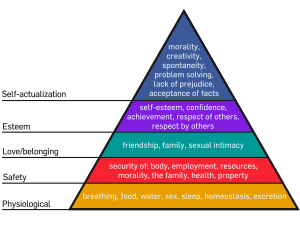I discussion of bias, or is it a license to dispense with scientific results that are displeasing? Where are the outside mechanism to help scientists when they cannot help themselves, because of their own bias.
Why is the mechanism of publication insufficient, when in all other scientific fields it has been exactly the way that the scientific community/mainstream dispensed with invalid results and replaced them with valid ones?
If these (don’t-you-dare-call-them-deniers) “bias-busters” could point to successes in other scientific fields for other scientific questions, all thanks given to their “bias-busting” scrutiny, a lot of people would see the benefit and drop suspicion.
Otherwise, we must pre-suppose that climate science is a “nonesuch” science — the only scientific domain where the practitioners must be protected from themselves.
Where is the rich history of success of outsiders providing “bias-busting” services for scientists? The outsiders that really help scientific progress get to know the practitioners and labs and journals so intimately, they end up having choices about how they ultimately publish and add to the literature — and that is, in fact, how it ultimately plays out successfully. And *not* by providing outsourced “bias-busting” services.
reply to Hector M. #14
I don’t deny that some assert that climate scientists must be protected from themselves. I am curious to learn of the historical cases where outsiders’ free-lance bias-busting was found to be successful.
Because similar arguments were made that a cabal of Darwinists suppress papers that show intelligent design, and a cabal of medical regulators suppress papers that disprove tobacco carcinogenicity, and a cabal of dentists suppress facts about fluoridation’s mild control properties.
If I could consider the historical cases of success of outsiders’ free-lance bias-busting, when scientific practitioners needed to be protected from themselves, I could discern between clear-eyed skeptics and delusional denialists, and see if the proposed cure fits the illness.
Much like the judgement of the need for carbon taxation may be informed by the history of regulatory prohibitions of fluorocarbons. (Or the regulatory prohibitions on the sale of alcohol in the United States, they don’t all have to be positive examples of regulation.)
I am genuinely interested to learn more about outsiders’ free-lance bias-busting in science, where it had an effect, maybe good, maybe bad. You overlooked part of my original remark in your reply.
It would be much easier see the good intentions of these denialists, if they didn't demand that everyone assume that climate science is a nonesuch science.
[Ugh, more]
reply to Judith Curry #24
"Scientific biases are challenging enough, but when these are augmented by political bias and a policy agenda, then the bias issue becomes the overwhelming challenge for the science."
This is asserted, but not demonstrated.
As a process that embraces self-correction, it is hard to come up with examples of errors that science has allowed to let stand, for all time, because of political bias and a policy agenda. I can't think of any.
[Aside: The closest I can think of is the denying of the possibility of a numerical intelligence quotient in the polite company of scientist, even though it is at least as well established as the Big Five Personality model, which is uncontroversial. But does that even count? Nobody is barred from publishing and the truth is available to the motivated. I am genuinely curious - Are there any examples of errors that science has allowed to let stand, for all time, because of political bias and a policy agenda?]
Is there really a need for a unique outside agent to police bias in climate science, alone? The same process of refereed journal publication, that serves the scientific community/mainstream in other fields to dispense with invalid results and replace them with valid ones, breaks down *only* for climate science? And where is the model for successful outside policing of scientific bias? Does one even exist? That would be even more controversial than the already controversial remedy of carbon taxation, because there is already research on the economic effects of taxation, and a history of taxation to counter perverse externalities.
Or is the issue of bias - a bias so insidious science should not dare to leave the extermination to mere scientists - a red herring?
The demand to treat climate science as a "nonesuch" science is the rub. How can I distinguish a prickly intolerance for the possibility of bias from an excuse to discard results that are unwelcome from an excuse to disregard consequences of
status quo behavior?
Reply to Bill Stoltzfus #26
Part of the reason that Judith Cury's "Team B" idea went over like a lead balloon was that the name "Team B" had an unfortunate historical connotation to the "Team B", commissioned by
Director of Central Intelligence George H. W. Bush, of "outside experts" who attempted to counter the positions of intelligence officials within the
CIA. In reality, the CIA failed to represent
USSR as enough of a military threat for the liking of defense hawks, so Team B manufactured Soviet military capabilities from whole cloth.
http://en.wikipedia.org/wiki/Team_B
I would rather 100% of published scientific results be attempted for replication by third parties, rather than 20% of funding be spent on fishing expeditions. Because, if this is a mechanism outside of current scientific publishing guidelines, a group of outsiders would choose where the 20% was directed. Leaving aside the issue that the comparative invulnerability to political and other agendas of this extra-scientific group is being simply asserted without basis.
Then there is the strange issue why science is singled out for hobbling. What percentage of business, family, or personal decisions (the analog of scientific results) must be legislated for scrutiny by third parties? Because is the track record of science worse than the tract record of business, family, or personal decision making?
[double ugh, even more]
Reply to Steve Fitzpatrick #29
I am looking for ways to distinguish accusation of insurmountable bias in climate science from such claims made against in evolutionary biology, tobacco carcinogenicity, vaccine research, etc.
You bring up FDA regulations, but then conflate the issue by stating "Note that these regulations exist in good part to eliminate as much as possible the influence of biases", when in fact these are strictly to try to prevent direct harm to patients by the treatment intervention under investigation. Demonstrated by how they do nothing to prevent biases that don't strictly harm patients directly -- how else could the bias for over-reliance on pharmaceuticals stand?... if these were, by design, to try to eliminate bias?
"But a more relevant question is “Are there examples of errors that science has allowed to stand for a significant period of time?” A search for these kinds of examples might not be so difficult." Then humor me. The remedy, to fit the topic, must be an extra-scientific mechanism to eliminate bias that scientists are fundamentally otherwise unable to. To best understand the beast being discussed, I would appreciate examples. If it never existed, and never will, then that is the very definition of a red herring to discard results that are unwelcome and an excuse to disregard consequences of the status quo. I would like to see this is a good faith argument.
I don't deny that the public demands more from climate scientists than protein folders. But I want to see the distinction of the demand from the demands put on evolutionary biologists by members of the public, from the demands put on mathematicians by those who trisect the angle or square the circle, from the demands put on medical animal researchers by the property destruction and harassment by anti-vivisectionist protesters, etc. Are the demands, for the most part, strictly to promote scientific truth found in the least time in the efficient way? Or not?









![Reblog this post [with Zemanta]](http://img.zemanta.com/reblog_e.png?x-id=491b955d-ed6d-440e-830e-7db2b81c488d)

![Reblog this post [with Zemanta]](http://img.zemanta.com/reblog_e.png?x-id=94274982-4a2a-471d-98c3-742ecdf93a18)